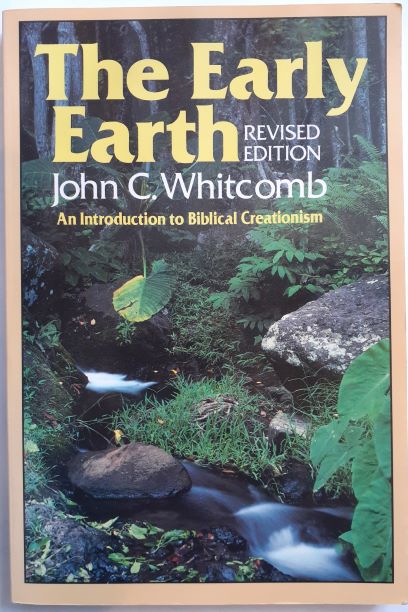A review of Dr. John C. Whitcomb’s book The Early Earth Revised Edition, An Introduction to Biblical Creationism

Dr. Whitcomb’s goal of helping readers understand Biblical Creationism is superbly accomplished in this book. He defines creationism and walks readers through what happened during the creation week. As he does that, Whitcomb contrasts Biblical Creationism with evolutionary ideas and shows the problems of trying to merge the two into the model called theistic evolution. I really liked how he addressed the limitations of science which require faith at some point in the discussion of origins by everyone.
Whitcomb began by laying the foundational understanding that creation must have been a supernatural process. “In other words, the world came into being in a way that was entirely different from anything that may be observed in the present universe. Today absolutely nothing is being created directly apart from preexistent materials, and scientists express this basic truth in terms of the first law of thermodynamics (i.e. energy can be neither created nor destroyed.)” (p. 19)
The fact that creation was supernatural has become a problem for modern man. Why? Because that means no one can know about it unless God revealed it. He has revealed it in the Bible but people are sinful (we don’t like God telling us what to do) so we don’t want to accept what God has said. (I Corinthians 2:14)
Instead, we have come up with the modern myth of evolution and believe that the universe came into existence through natural processes. “It is a myth, not simply because it contradicts Scripture, but because it contradicts the observable processes of science.” (p. 21)
The sudden part of creation is encapsuled in the six literal days described in Genesis 1. Whitcomb helped readers understand that the Hebrew word used for day in Genesis always refers to a 24 hour day when connected with a number, such as “the first day.” The Bible clearly does not leave any room for anyone to place long periods of time with the creation of the universe as required by theistic evolutionists. (p. 28)
In his chapter titled “The Creation of the Universe” Whitcomb explained that any approach to the origins of the universe is founded on faith. Everyone looks at the world and its history from an assumed point of view or a set of beliefs. Since no human was present at the beginning, we must have faith in what someone else has said about origins. The evolutionist accepts by faith the ideas that man has invented about how we got here. In contrast, the creationist accepts by faith what God said about the beginning of our world. (Hebrews 11:3)
In this chapter he discussed how God made the stars and planets. He also explained how science has debunked evolutionary ideas about the planets originating from the sun or a nebular explosion in terms that anyone could easily understand.
Readers will find Whitcomb’s chapter in which he clarified what the Bible says about the creation of plants and animals very helpful. Whereas evolution claims animals changed from lower life forms to more complex ones, God has clearly created many different types of plants and animals and placed limits on them so that no species can change into another one.
“Instead of a single family tree of living things, the Bible presents the picture of a great forest of trees of living things, each ‘tree’ supernaturally created with the genetic potentialities for variation or branches, but within the strict confines of the created identity of the ‘tree.’” (p.93) For example, there are many different breeds of dogs which come in various sizes and shapes but they are all dogs. Though a big dog might be as large as a small horse, they are entirely different animals with no relation whatsoever.
Probably the most anticipated chapter in the book is “The Creation of Mankind”. In it, Whitcomb covers the dignity of man, the direct creation of Adam’s body, and discusses the incredible complexity of the human body. He also, convincingly shoots down the evolutionary idea that humans came from apes and shines light on the lack of any evidence of an ape-man from the past. “Famous ‘ape-man’ evidences, such as Piltdown, Nebraska, Neanderthal, Pithecanthropus Erectus, Peking, Homo Habilis, and Zinjanthropus Man, have already been discredited by careful and objective analysis.” (p. 128)
Book Application
Whitcomb briefly addressed the profound differences in DNA between humans and apes. Though not exhaustive, it is helpful because scientists then and now know that random genetic mutations are harmful, yet evolutionists continue to claim DNA links men and apes. So, I found it peculiar that a National Geographic article from 2005 was titled “Chimps, Humans 96 Percent the Same, Gene Study Finds”.
Why is this peculiar? They basically stated that chimpanzees and humans are the same except that “researchers were able to identify a couple thousand differences that are potentially important to the evolution of the human lineage.” So the percent of DNA differences is small but that small percent happens to be a couple thousand items! This flawed 2005 study is still cited as proof of evolution in spite of the fact that scientists know the chimpanzee DNA sample was contaminated with human DNA.1 Even if it wasn’t “This is actually a huge difference that far exceeds the ability of even the most optimistic evolutionary scenarios to create, even given the claimed millions of years.”2
So Dr. Whitcomb was right even before the advanced DNA tools of today were available. Why was he right? Because God made DNA different for each plant and animal during creation and placed limits on how much it could change.
The really sad thing is that some Christians lost their faith because of the latest scientific claim to have proven evolution, which was wrong, just as all the ones before it. This is why Dr. Whitcomb’s book is so valuable. It helps people understand what God has done and what He has said about origins and its impact on us today.
Knowing what really happened and having a faith that is based on facts, Christians should not be carried away by human ideas, no matter how enticing or authoritative they appear. No human knows more than God, so we should trust the Almighty with our past, present, and future – including how to get to Heaven. Yes, your belief about origins matters, so get this book!
